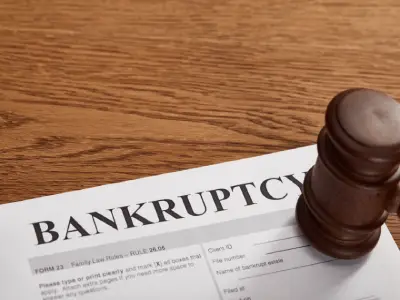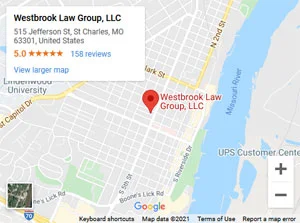Chapter 13 Bankruptcy Attorney in St. Charles, Missouri
Chapter 13 bankruptcy, one of the most effective debts and bankruptcy relief options, allows you to regain control of your finances and start over. The vast majority of debtors opt for Chapter 13 bankruptcy as a solution to their financial problems. The bankruptcy chapter described above is not open to everyone, though. Debtors with considerable assets and a steady income stream usually benefit from this type of bankruptcy. With the help of a Missouri bankruptcy lawyer, you can evaluate your finances and determine whether you qualify for Chapter 13 bankruptcy and if it can eliminate your debt issues.
The Westbrook Law Group has offered bankruptcy legal advice and services to individuals and businesses for many years. Depending on the objectives and goals of the customer, we create specialized plans and strategies. From the moment you decide to get out of debt until you achieve financial freedom, we will be by your side every step of the journey.
Call us immediately for a free legal consultation.
Why Do I Need a Bankruptcy Attorney in St. Charles, MO?
If you decide to work with our St. Charles Chapter 13 lawyers, the following is a list of things to anticipate:
- The initial consultation is free of charge.
- Finalize the legal documentation and file the case.
- Attend the meeting of creditors.
- Initial payment is 30 days after filing.
- Plan approval 30 to 60 days following the creditors’ meeting.
- 36–60 months of payments.
- The plan will be discharged after completion.
What are the Basic Things You Need to Know About Chapter 13 Bankruptcy?
A Chapter 13 bankruptcy is an option for both people and businesses, in contrast to several other types of bankruptcy. It enables a debtor, whether an individual or a company, to reorganize and restructure their debts to creditors. Chapter 13 proceedings are distinct from Chapter 7 and Chapter 11 proceedings. A person’s debt is discharged in a Chapter 7 proceeding. In other words, the bankruptcy process relieves a person of most of their debt obligations. The majority of the debt a company owes to its creditors is discharged in a Chapter 11 case.
- A person reorganizes their debt in a Chapter 13 bankruptcy so that they propose to pay their creditors their disposable income over three to five years.
- All future transactions between a debtor and their creditors are described in the written memorialization of the plan.
- Monthly payment is made by the debtor for a fee to the court-appointed trustee, who then distributes the funds among the bankrupt’s creditors. The payment plan’s obligations or debts must be met or paid off by the debtor within a set period that the court specifies. In compliance with the US Bankruptcy Code, a repayment plan in a Chapter 13 bankruptcy case may last up to five years.
- The debtor typically preserves their property, while the creditors get significantly less money than they would have if they hadn’t filed for bankruptcy.
In a bankruptcy proceeding, the trustee will calculate how much a debtor must pay them each month based on their income and the total debt amount they owe to all their creditors. If necessary payments are not made, the bankruptcy case will be dismissed.
What is the Role of a Chapter 13 Bankruptcy Trustee?
 Through a three- to a five-year repayment plan, a Chapter 13 bankruptcy reorganizes your debt by enabling you to pay some or all of what you owe to your creditors. The management of the program reviews the Chapter 13 bankruptcy trustee who’s assigned to handle your case.
Through a three- to a five-year repayment plan, a Chapter 13 bankruptcy reorganizes your debt by enabling you to pay some or all of what you owe to your creditors. The management of the program reviews the Chapter 13 bankruptcy trustee who’s assigned to handle your case.
The primary objective of the Chapter 13 trustee is to pay as much money as possible to any unsecured creditors you may have. This is because unsecured creditors are placed at the bottom of the priority scale. This kind of creditor is presumably to be released after the payment plan. A St. Charles bankruptcy lawyer should be able to prevent this even if the trustee thinks your plan payment should go up to pay more to your unsecured creditors.
The trustee is responsible for a variety of tasks, including:
- Examining the bankruptcy documents;
- Scrutinizing the proposed plan’s adherence to bankruptcy regulations;
- Distributing funds to debtors and collecting plan payments, and
- Following the guidelines of the Chapter 13 plan.
How Does the Bankruptcy Trustee Review Your Chapter 13 Plan?
Your recommended repayment strategy explains how you expect to pay back your creditors partially or entirely.
- The trustee’s responsibility includes ensuring your Chapter 13 repayment plan is equitable to your creditors.
- If the trustee discovers a flaw in your plan, they will probably raise it before the meeting of creditors and make an informal attempt to fix it.
- If you cannot agree, the trustee will submit a motion to the bankruptcy court requesting a decision.
By submitting a motion, your creditors may also contest your plan. Before the judge makes a decision, you will have the chance to respond to the proposal in either scenario.
Preside over the Creditors’ Meeting
You must appear in person at a Chapter 13 hearing of creditors about a month after filing your case. You need to provide identification to prove your identity as the petitioner during the hearing. You should submit a day or two before the hearing if the meeting is virtual.
During the hearing, you will be sworn in and answer the trustee’s questions about the details in your bankruptcy paperwork, supporting documents, and plan.
The trustee will likely inquire about the accuracy of all the information in your Chapter 13 bankruptcy petition, whether you anticipate receiving any new assets soon, and any other bankruptcy-related details. There will also be a chance for inquiries from your creditors.
If additional proof is required, the trustee will postpone the meeting until another time. If not, the trustee will adjourn the meeting.
During the Confirmation Hearing
The trustee will testify at the confirmation hearing and inform the judge whether they think the plan is workable and compliant with all criteria. It will be up to the judge to “confirm” or approve the proposal. You’ll probably be given time to fix any problems with the plan if there are any.
Carries Out Bankruptcy Repayment Plan
After filing your Chapter 13 case, you have 30 days to start making monthly payments to the bankruptcy trustee following your suggested plan.
The trustee holds the money in trust for your creditors while your repayment plan is pending court approval.
The Chapter 13 trustee starts paying your creditors according to the plan’s conditions after the court gives the go-ahead. You will receive the cash provided to the trustee, with a few restrictions, even if the court rejects the plan.
The trustee will send payments to your creditors over three to five years to finish a Chapter 13 plan.
Objects to Wrongful Claims of a Creditor
Within 70 days of filing, creditors who want to obtain Chapter 13 funds must submit a proof of claim to the court since government creditors have 180 days. A contract or other agreement-related material is included in the evidence of a claim, together with a statement of the debt to the creditor.
In reviewing the creditor claims, the Chapter 13 trustee raises objections to any filed incorrectly or without the necessary supporting documents. Additionally, other parties may object.
How Do You Pay a Chapter 13 Trustee?
For each case they deal with, the bankruptcy trustee is paid a minimal flat fee to assure objectivity. The trustee is compensated from your monthly repayment plan in a Chapter 13 bankruptcy. This fee is limited by law to 5% of the total sum.
Contact our St. Charles Bankruptcy Attorney Now!
If you want additional details about the Chapter 13 bankruptcy trustee, the best thing to do is schedule an initial appointment. The Westbrook Law Group can provide you information, legal advice, and immediate response to your legal issues.
You can relieve yourself of your burdensome debt and stress with the help of our Chapter 13 bankruptcy lawyers in St. Charles, Missouri. You won’t be required to make any compromises, and you don’t need to. Create an appointment with a Missouri bankruptcy lawyer by calling us immediately to discuss your debt!


